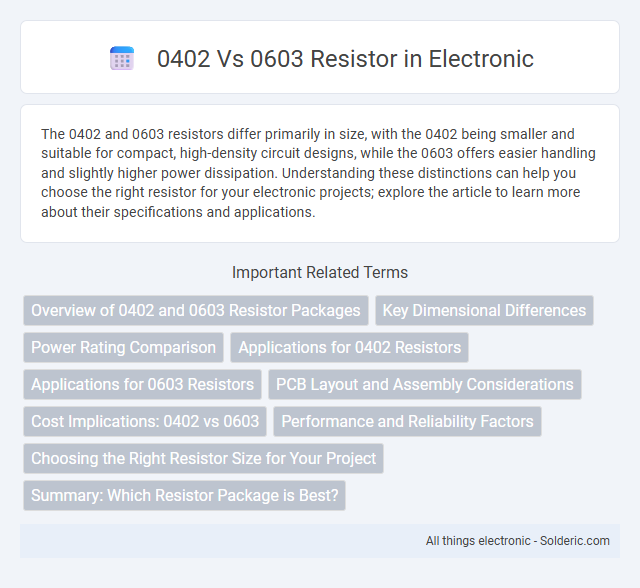The 0402 and 0603 resistors differ primarily in size, with the 0402 being smaller and suitable for compact, high-density circuit designs, while the 0603 offers easier handling and slightly higher power dissipation. Understanding these distinctions can help you choose the right resistor for your electronic projects; explore the article to learn more about their specifications and applications.
Comparison Table
| Feature | 0402 Resistor | 0603 Resistor |
|---|---|---|
| Size (inch) | 0.04 x 0.02 | 0.06 x 0.03 |
| Size (metric, mm) | 1.0 x 0.5 | 1.6 x 0.8 |
| Power Rating | 0.05W to 0.063W | 0.1W to 0.125W |
| Tolerance | +-1% to +-5% | +-1% to +-5% |
| Typical Applications | Compact electronics, high-density PCBs | Standard electronics, moderate-density PCBs |
| Cost | Higher (due to smaller size) | Lower (more common size) |
| Handling Difficulty | Higher (requires precise placement) | Lower (easier to handle) |
Overview of 0402 and 0603 Resistor Packages
0402 and 0603 resistor packages differ primarily in size, with 0402 measuring 0.04 by 0.02 inches and 0603 at 0.06 by 0.03 inches, affecting their power handling and placement density on PCBs. The smaller 0402 package allows higher circuit density and is ideal for compact, high-frequency applications, while 0603 offers better power dissipation and ease of handling for general-purpose use. Manufacturers often select between these packages based on space constraints, thermal performance, and assembly process capabilities.
Key Dimensional Differences
The 0402 resistor measures approximately 1.0 mm by 0.5 mm, offering a compact footprint ideal for high-density circuit designs, while the 0603 resistor is larger at about 1.6 mm by 0.8 mm, providing greater power dissipation capacity. The smaller 0402 size reduces PCB space consumption, which benefits miniaturized electronic devices, whereas the 0603's size allows for easier handling during assembly and improved thermal management. Your choice between these sizes should consider the balance between available board space and power requirements in your application.
Power Rating Comparison
The 0603 resistor typically offers a power rating of 0.1 watts, whereas the 0402 resistor usually supports only 0.0625 watts, making the 0603 more suitable for higher power dissipation applications. The larger physical size of the 0603 resistor enables better heat dissipation and increased reliability under higher-load conditions. Choosing between 0402 and 0603 resistors depends on the power requirements and space constraints of the circuit design.
Applications for 0402 Resistors
0402 resistors are ideal for high-density circuit boards where space is limited, such as in smartphones, wearable devices, and medical implants. Their compact size enables precise placement in miniature electronic assemblies, improving signal integrity and circuit performance. You benefit from enhanced design flexibility and higher component packing density by choosing 0402 resistors for advanced surface-mount technology (SMT) applications.
Applications for 0603 Resistors
0603 resistors are widely used in consumer electronics, including smartphones, tablets, and wearable devices, due to their balance of size and power handling capability. Their moderate footprint allows for efficient PCB space utilization while providing reliable performance in signal and power circuits. Common applications also include automotive electronics and medical devices where compact, durable components are essential for high-density circuit designs.
PCB Layout and Assembly Considerations
The 0402 resistor, measuring 0.04 by 0.02 inches, offers higher component density for compact PCB layouts but requires precise pick-and-place equipment due to its smaller size compared to the 0603 resistor, which is 0.06 by 0.03 inches. The larger 0603 size improves ease of manual assembly and inspection, reducing the risk of placement errors and shorts during soldering, making it advantageous for prototyping and lower-volume production runs. When designing PCB footprints, 0402 components demand tighter spacing and higher accuracy, affecting solder mask clearance and pad design, whereas 0603 allows slightly more tolerance in land patterns and reflow profiles.
Cost Implications: 0402 vs 0603
Choosing between 0402 and 0603 resistors significantly impacts your project's cost-efficiency. The smaller 0402 resistors generally incur higher manufacturing and assembly expenses due to precision handling and placement requirements, which can increase production costs. In contrast, 0603 resistors are more cost-effective with easier automated placement, making them a budget-friendly option for large-scale manufacturing without sacrificing performance.
Performance and Reliability Factors
0402 resistors offer superior performance in high-frequency applications due to their smaller parasitic inductance and capacitance, enhancing signal integrity. However, 0603 resistors generally provide better power dissipation and thermal reliability, making them suitable for environments with higher current loads. Your choice between 0402 and 0603 should balance the need for compact size against the demands for power handling and mechanical robustness.
Choosing the Right Resistor Size for Your Project
Choosing between 0402 and 0603 resistor sizes depends on your project's space constraints and power requirements. The 0402 resistor offers a smaller footprint, ideal for high-density circuit boards, but typically handles lower power dissipation compared to the larger 0603, which provides better thermal management and durability. Selecting the right resistor size ensures optimum performance and reliability tailored to your specific design needs.
Summary: Which Resistor Package is Best?
The 0402 resistor offers a smaller footprint ideal for high-density circuit designs demanding minimal space, while the 0603 resistor provides higher power dissipation and easier handling during assembly. For applications requiring compact size and fine pitch, 0402 is preferable, but 0603 is best suited for general-purpose use with improved reliability and thermal performance. Ultimately, the choice depends on the balance between board real estate, power requirements, and manufacturing processes.
0402 vs 0603 resistor Infographic

 solderic.com
solderic.com